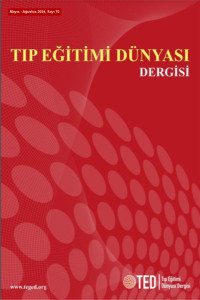Öz
Summary
Objective: The study aims to determine the internet and social media addiction levels of medical students and the factors affecting these levels. Our secondary aim is to emphasize the importance of this in the undergraduate medical education program so that our students can become good physicians with high awareness, using the internet and social media effectively and efficiently.
Material and Method: The population of the cross-sectional quantitative study consists of students studying at Aydın Adnan Menderes University Faculty of Medicine. In the study, an attempt was made to reach the entire population without selecting a sample, and 691 students who completed the data collection tool completely were included in the study. The questionnaire form used as a data collection tool consists of three parts. The first part of the form was for descriptive information about the participants; the second part consists of the "Internet Addiction Scale" developed by Hahn and Jerusalem (2001) and adapted to Turkish by Şahin and Korkmaz, and the third part consists of the "Social Media Addiction Scale - Student Form (SMBÖ-ÖF)" (2018) developed by Şahin.
Results: Of the 691 participants aged between 17-35 (21.1±2.4); 53.0% (n:366) were female , 47.0% (n:325) were male. The average of the internet addiction scores (35.5±12.1) and subscale scores of the participants were found to be low. The most common purpose of using the internet was found to be social media usage. Compared with different variables; it has been determined that; when academic success and the rate of using the internet for academic purposes increase internet addiction decreases, and internet use is less in those living at home with their family. Similarly, social media addiction is lower in academic success and those who use the internet for academic purposes; It was determined that it was lower in men and those living at home with their family.
Conclusion: Although studies show that internet and social media addiction is lower in medical faculties, internet and social media addiction is becoming a growing problem, especially among young people. It is important to identify the factors that increase the addiction levels of our students and try to prevent them. For medical students expected to take active roles in their professional lives for addiction protection and to become good physicians with high awareness using the internet, and social media effectively and efficiently, emphasizing addictions in undergraduate medical education programs and carrying out studies on the subject may be effective in preventing the problem.
Anahtar Kelimeler
Addiction internet medical faculty social media undergraduate medical education
Kaynakça
- 1.Chang, Y., & Ramnanan, C. J. (2015). A review of literature on medical students and scholarly research: experiences, attitudes, and outcomes. Academic Medicine, 90(8), 1162-1173
- 2.Sorial, A. K., Harrison-Holland, M., & Young, H. S. (2021). The impact of research intercalation during medical school on post-graduate career progression. BMC Medical Education, 21, 1-8.
- 3.Murdoch-Eaton, D., Drewery, S., Elton, S., Emmerson, C., Marshall, M., Smith, J. A., ... &
- 4.Whittle, S. (2010). What do medical students understand by research and research skills? Identifying research opportunities within undergraduate projects. Medical teacher, 32(3), e152-e160.
Öz
Amaç: Çalışmanın amacı; tıp fakültesi öğrencilerinde internet ve sosyal medya bağımlılık düzeylerini belirleyerek bunu etkileyen etmenleri saptamaktır. Öğrencilerimizin internet ve sosyal medyayı etkin ve etkili kullanabilen, farkındalığı yüksek iyi hekimler olabilmeleri için mezuniyet öncesi eğitim programında bunun önemini vurgulamak ise ikincil amacımızdır.
Gereç ve Yöntem: Kesitsel tipteki nicel çalışmanın evrenini, Aydın Adnan Menderes Üniversitesi Tıp Fakültesi'nde öğrenim görmekte olan öğrenciler oluşturmaktadır. Çalışmada örneklem seçimine gidilmeden evrenin tamamına ulaşılmaya çalışılmış, veri toplama aracını eksiksiz dolduran 691 öğrenci çalışmaya dâhil edilmiştir. Veri toplama aracı olarak kullanılan anket formu üç bölümden oluşmaktadır. Formun ilk bölümü; katılımcılara ilişkin tanımlayıcı bilgilerin sorgulandığı bölüm, ikinci bölüm Hahn ve Jerusalem tarafından geliştirilip Şahin ve Korkmaz tarafından Türkçe’ye uyarlanan "İnternet Bağımlılık Ölçeği", üçüncü bölüm ise Şahin tarafından geliştirilen "Sosyal Medya Bağımlılığı Ölçeği - Öğrenci Formundan (SMBÖ-ÖF)" oluşmaktadır.
Bulgular: Yaşları 17-35 (21,1±2,4) arasında değişmekte olan 691 katılımcının %53,0’ü (n:366) kadın, %47,0’si (n:325) erkek idi. Katılımcıların internet bağımlılığı puanı ortalaması (35,5±12,1) ve alt boyut puan ortalamaları düşük düzeyde saptanmıştır. İnterneti kullanma amacının en fazla sosyal medya kullanımı olduğu belirlenmiştir. Farklı değişkenler ile karşılaştırıldığında; akademik başarı ve interneti akademik amaçlı kullanım oranı arttıkça internet bağımlılığının azaldığı, evde ailesi ile yaşayanlarda yine internet kullanımının daha az olduğu belirlenmiştir. Sosyal medya bağımlılığının benzer şekilde akademik başarı ve interneti akademik amaçla kullananlarda daha düşük olduğu; erkeklerde ve evde ailesi ile yaşayanlarda daha düşük olduğu belirlenmiştir.
Sonuç: Yapılan çalışmalar her ne kadar tıp fakültelerinde internet ve sosyal medya bağımlılığının daha düşük seyrettiğini gösterse de günümüzde internet ve sosyal medya bağımlılığı özellikle gençler arasında giderek büyüyen bir sorun halini almaktadır. Öğrencilerimizin bağımlılık düzeylerini artıran etkenlerin belirlenerek önlenmeye çalışılması önem taşımaktadır. Meslek yaşantılarında bağımlılıklardan korunmada aktif rol alması beklenen tıp fakültesi öğrencilerinin internet ve sosyal medyayı etkin ve etkili kullanabilen, farkındalığı yüksek iyi hekimler olabilmeleri için mezuniyet öncesi eğitim programlarında bağımlılıklara gereken önemin verilerek vurgulanması ve konu ile ilgili çalışmaların yapılması sorunun önlenmesi için etkili olabilecektir.
Anahtar Kelimeler
bağımlılık internet mezuniyet öncesi eğitim sosyal medya tıp fakültesi
Kaynakça
- 1.Chang, Y., & Ramnanan, C. J. (2015). A review of literature on medical students and scholarly research: experiences, attitudes, and outcomes. Academic Medicine, 90(8), 1162-1173
- 2.Sorial, A. K., Harrison-Holland, M., & Young, H. S. (2021). The impact of research intercalation during medical school on post-graduate career progression. BMC Medical Education, 21, 1-8.
- 3.Murdoch-Eaton, D., Drewery, S., Elton, S., Emmerson, C., Marshall, M., Smith, J. A., ... &
- 4.Whittle, S. (2010). What do medical students understand by research and research skills? Identifying research opportunities within undergraduate projects. Medical teacher, 32(3), e152-e160.
Ayrıntılar
| Birincil Dil | Türkçe |
|---|---|
| Konular | Tıp Eğitimi |
| Bölüm | Orjinal Araştırma |
| Yazarlar | |
| Yayımlanma Tarihi | 31 Ağustos 2024 |
| Gönderilme Tarihi | 27 Aralık 2023 |
| Kabul Tarihi | 12 Ağustos 2024 |
| Yayımlandığı Sayı | Yıl 2024 Cilt: 23 Sayı: 70 |

